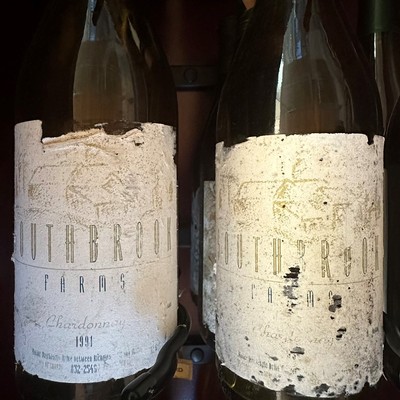Should You Cellar That Wine
Questions we've been getting:
Do all wines get better with age?
How does one know if a wine is ready?
How should wines be stored for aging?
I'm going to focus on the first question today and the answer is no.

The labels don't look great, but the wine is quite lovely!
One of the most groundbreaking wine books of all time is Jancis Robinson’s book Vintage Timecharts. Up until then, most books about wine were like travel guides (my bookcase is full of them). They took you to a place, told you about the region and the producers and told you what the wines should taste like. Vintage Timecharts takes you on a voyage through time. She selected a group of classic wines from around the world and chose some recent vintages of each. She then marked the arc of each wine's progress on a calendar of the future: as its quality got better and then faded over time. Each vintage was different: big soft ones rising to a quick peak and then fading fast, and wines with a lot of stuffing that take a long time to mature but rise higher, then take a long time to decline.
This book was first published in 1989, when I was studying and buying wine and it really fed my passion for aging wines. This was before we had even thought about starting a winery (maybe it was a contributing factor?) but it certainly fed into the style of wine that I wanted to - and still - make: age-worthy.
Vintage Timecharts clearly shows that wines can be made to last, but that ageability comes via decisions made in the winery. You can choose to make lighter wines that will be drinkable younger, by doing less extraction (of colours and tannins from the skins), and leaving more residual sugar, but to reach the ultimate peak potential, the wines have to be made to last. This is what we have always tried to do for the Southbrook Estate and Single Vineyard wines.
The other thing about aging wines is that as they change, their use or occasion changes too.
Young wines have a flamboyance and any slight awkwardness can be forgiven. They are to be consumed, but not necessarily studied. The flavours should be delicious and fresh.
When you keep wine in the cellar, or when someone gives you a gift of a treasured bottle, there is always the worry that it may have passed its peak. As a wine ages, the flavours evolve from primary to secondary to tertiary. Primary flavours are those from the fruit. A strawberry from the field tastes like a strawberry, and a grape tastes like a grape. This is all changed with the fermentation process.
With fermentation, the primary flavours evolve into what are called secondary flavours. The wine might be fruity, but not grapey. Terms like blackcurrant, cherry and apple are bandied about, along with more evocative descriptors like brioche, butter and spice.
Tertiary flavours come with more time, but you have to be a bit careful. Not all wines are made to age gracefully. The care in viticulture, winemaking and even the packaging can influence the results (don't restrict yourself to corks, some screwcaps are designed for good aging). Making wines that are meant to age is expensive and time consuming. It takes longer to make ageable wines, and it takes them longer to reach their peak.
Tertiary flavours are often flavours that don’t taste of fruit, and can sort of sound weird, at least until you have experienced them. Descriptors like forest floor, pencil box, and mushroom are often used. Older wines seem to develop a richness of umami, which makes them more interesting, but also more filling. Aged wines change from a complement to the meal to the centre of attention. They are something to share and to contemplate, to think of the history since the wine was made and enjoy the tiny perfect time capsule.
Where do you find wines that have aged? It is tough. We have some older Southbrook wines available here at the winery. Reply to this email if you're interested.
Sometimes you will see older wines in auctions, but this can be risky. You really need to know how they have been stored, because if the storage was poor, the wines might not be drinkable. Rarely does the LCBO carry them, except in what they used to call the Classics Catalogue. Wineries may have libraries and fine wine stores in the US and the UK will have some as well.
How else can I learn about older wines? Look for wine clubs in your area. In the GTA, Winetasters of Toronto and Toronto Vintners have tastings of older wines. If you're looking to try aging some wines in your cellar, choose wines and wineries that have a track record for ageable wines.
Classic varieties for aging are the Bordeaux reds (Cabernets Sauvignon and Franc, Merlot and Petit Verdot), other reds like Pinot Noir and Syrah, and whites made from Chardonnay and Riesling. Some other varieties will age, but success varies by region. Do you have to age all wines? No. Just as you can get joy from driving a Ferrari at 100 k/h, even though you know that it could do 300 k/h, enjoying a bottle that you could have kept for another 10 years will be equally pleasurable.
A visiting winemaker joined us in our Friday staff tasting yesterday and pronounced, over a glass of fairly deeply coloured red wine , "this is a good old red Bordeaux " while it was actually a Southbrook 1998 Cabernet Merlot. Made my week!